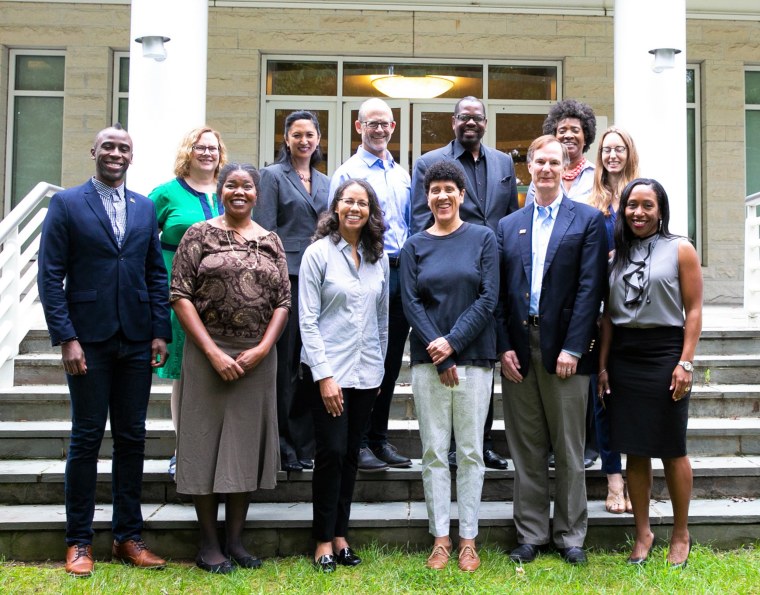African Americans make up a small fraction of college graduates with physics and astronomy degrees, and so risk missing out on many of the lucrative new technology jobs, some industry experts say.
That observation comes after a task force, backed by the American Institute of Physics, recommended that physical science societies create a $50 million endowment to support students of color in physics and astronomy.
The task force, which released a report last month on the “underrepresentation” of African Americans in physics and astronomy, hopes to see the number of bachelor’s degrees awarded to African Americans in physics and astronomy double by 2030, to at least 500 a year.
In the coming months, panel members will speak at science conferences and events to build support for the recommendations.
"All of the growing disciplines — the self-driving cars, all of the satellite technology necessary for our cellphone communications and transmissions — these are all topics that are undergirded and underpinned by physics," said Tabbetha Dobbins, a task force member and an associate professor in physics and astronomy at Rowan University in New Jersey.
"Students are really able to enter the emerging technologies with the physics degree,” she said. “That’s no doubt.”
Arlene Modeste Knowles, project manager for the task force, said there has been an “unprecedented rise” in the number of bachelor’s degrees awarded in physics over the past two decades.
“The question is: Why haven’t African Americans shared in this success?” she said.
Fewer than 4 percent of all physics bachelor’s degrees went to African American students in 2017, according to the American Institute of Physics, or AIP, a federation of professional societies in the physical sciences that collectively have about 120,000 members.
And less than 2 percent of astronomy bachelor’s degrees went to African Americans that year, AIP said.
Those numbers have to change, said the 12-member panel, called the National Task Force to Elevate African American Representation in Undergraduate Physics & Astronomy. The panel identified five factors responsible for the success or failure of African American students in physics and astronomy. They include having a sense of belonging, academic and personal support, and leadership within science departments.
Because African American students can face “enormous financial challenges” and often find a less-than-supportive environment, success is harder to achieve, the report said.
“The underlying norms, values, and culture of the profession need to be addressed before lasting changes can occur,” the task force said in a news release.
The panel’s two-year investigation included more than 230 student and faculty surveys, in-person interviews with African American students, and visits to physics departments at colleges and universities that have seen larger numbers of African American students graduate.
Promoting diversity within the field isn’t just a moral imperative, experts say. It’s also a fiscal necessity to keep African Americans from being left behind in the increasingly tech-heavy workforce.
Carol Scarlett, an assistant physics professor at Florida Agricultural & Mechanical University, is a member of the National Society of Black Physicists, one of the largest organizations devoted to the growth and advancement of African Americans in physics.
Scarlett expressed concern that if “you don't have an African American population that is skilled in understanding fundamentally how things work, how things are put together, then you're not going to have African Americans making the kinds of achievements that you'll see out of other groups. “
"You don't want minority populations to be cut off from the process of creating technology, and some of the most fundamental aspects of technology come right out of physics," she said.
Modeste Knowles, the project manager, said that “having diverse people tackle important problems leads to better solutions.”
“African American students bring their unique perspectives to classrooms and scientific research, which leads to new solutions that benefit the field and ultimately the broader society,” she said.
Ed Bertschinger, a physics professor at the Massachusetts Institute of Technology and a co-chair of the task force, said in a statement: “The culture of physics and astronomy today affects discoveries that will or won’t be made by these scholars in the future.”
In discussing the proposed $50 million endowment, the panel recommends that half of it go to directly supporting African American physics and astronomy students and the other half to support departments’ implementation of the report’s recommendations, particularly those at historically black colleges and universities, or HBCUs.
The focus of the physics institute comes as major endowments are being created at several HBCUs to boost support for African American students in STEM programs.
In late January, Howard University said it received a $10 million gift from the Karsh Family Foundation, the largest donation in its 153-year history, to fund its efforts to diversify STEM fields.
Spelman College received a $30 million donation from one of its trustees in December 2019, the largest in its 137-year history. And in October, Oprah Winfrey established a record $13 million endowment at Morehouse College.
Experts acknowledged that the image of a physicist tends to be that of a white male, the demographic that makes up the bulk of the graduating classes.
But they said the field is ripe for diversity.
“I will tell you there are just as many nerdy black kids who would love to be physicists and engineers as there are nerdy Jewish kids or nerdy white kids,” Scarlett said, adding that it's not a difference “in capacity, it’s a difference in opportunity.”
